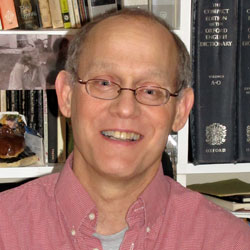Light the pursuer, dark the pursued.
Light wants to fill dark with itself
and have it still be dark
so light can still be filling it.
Light pours from the massive shining of the chandelier
over the bronze boy bending beneath it
to the bronze pool where a watery face
is rising to meet his as he bends.
Light the pursuer, dark the pursued,
along the naked back and arms,
the hands, the fingers reaching
for the rippling features, just
beyond, just out of the grasp of
into and out of, and across
the marble floor and pillars,
to the tips of leaves, and up
the lion claws of chair legs and sofas and
over the glass tops of tables in the lounge,
light losing dark by catching it,
dark giving light the slip by being caught,
on elevator doors, down every
blazing hallway to the highest floor,
the farthest room, and through it
beyond the pulsing colors of the muted screen,
from hip to hip in a loose twilight
of sheets no longer shifting.
Notes on the Poem
Alan Shapiro's "Hotel Lobby" is part of a collection entitled "Night of the Republic" in which the poems explore normally busy places when they are unoccupied. As the judges' citation for this Griffin Poetry Prize 2013 shortlisted work describes it "Shapiro’s unwavering gaze fixes on vacant public spaces at night ... and finds in those absences a way to read the marks of human presence ..." Shapiro brings uninhabited places and inanimate objects to subtle, pulsing life. A bronze statue gazes at his reflection in a bronze pool. (The phrase "as he bends" seems to suggest the statue is actually in motion.) Could those chair legs really morph into lion claws? It's all a little unnerving. Throughout it all - from chandelier to statue to floor to pillars to furniture to elevator to hallway - light and dark are pursuing each other doggedly, with a seemingly all-consuming passion: "Light the pursuer, dark the pursued. Light wants to fill dark with itself and have it still be dark so light can still be filling it." The play of light and dark adds to the sense that this seemingly abandoned space is teeming with more life than is evident at first or cursory glance. How are you going to feel the next time you pass through a hotel lobby at night, whisk upward countless flights in a silent elevator, settle with your familiar personal routines in an unfamiliar setting, and attempt to go to sleep? Will you wonder what might be happening when your "sheets [are] no longer shifting" ...?
